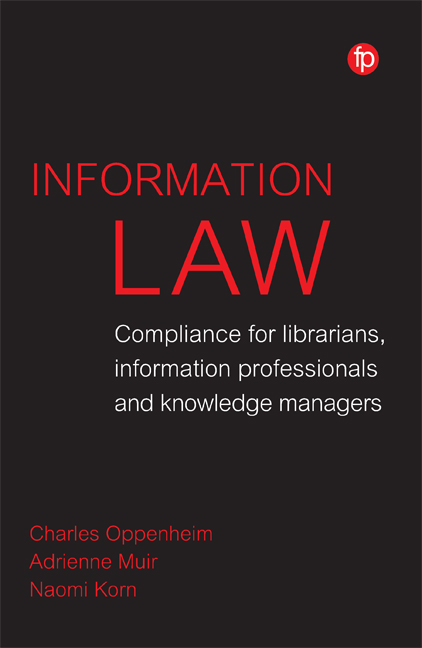Book contents
- Frontamtter
- Contents
- List of Acronyms
- List of Figures and Tables
- List of Case Studies
- Introduction
- 1 Copyright and Related Rights
- 2 Data Protection
- 3 Freedom of Information
- 4 Governance, Audits and Risk Assessment
- 5 Policies
- 6 Procedures: Copyright and Related Rights
- 7 Procedures: Using and Negotiating Licences for Access to Information Resources
- 8 Procedures: Data Protection and Freedom of Information
- 9 Tools and Templates
- 10 Awareness and Engagement
- 11 Some Speculations About the Future
- Appendix 1 Carrying out an Information Asset Audit
- Appendix 2 Sample IP Policy
- Appendix 3 Sample Data Protection Policy
- Appendix 4 Possible Contractual Terms for Online Access to Database Service
- Appendix 5 Data Protection Privacy Notice Template
- Bibliography
- Index
6 - Procedures: Copyright and Related Rights
Published online by Cambridge University Press: 29 July 2020
- Frontamtter
- Contents
- List of Acronyms
- List of Figures and Tables
- List of Case Studies
- Introduction
- 1 Copyright and Related Rights
- 2 Data Protection
- 3 Freedom of Information
- 4 Governance, Audits and Risk Assessment
- 5 Policies
- 6 Procedures: Copyright and Related Rights
- 7 Procedures: Using and Negotiating Licences for Access to Information Resources
- 8 Procedures: Data Protection and Freedom of Information
- 9 Tools and Templates
- 10 Awareness and Engagement
- 11 Some Speculations About the Future
- Appendix 1 Carrying out an Information Asset Audit
- Appendix 2 Sample IP Policy
- Appendix 3 Sample Data Protection Policy
- Appendix 4 Possible Contractual Terms for Online Access to Database Service
- Appendix 5 Data Protection Privacy Notice Template
- Bibliography
- Index
Summary
Introduction
Information policies set out an organisation's objectives with regard to management of information, including IPR management. Organisations must also develop procedures to achieve these objectives. Procedures should be designed not only to implement policies, but also to do so effectively and as efficiently as possible. Information policies are organisation-wide, but procedures may have to be tailored to reflect the respective roles and responsibilities of different functions within the organisation. It should be assumed that procedures are likely to adapt to their environment and thus change more frequently than policies. Staff will implement procedures, but other stakeholders, such as contractors, agents, customers, users or visitors, will also have a part to play.
A core purpose of information policy is to ensure legal compliance and accountability, and procedures should reflect this. Other considerations include the protection and/or exploitation of information assets, a commitment to good service, reputation and fairness and transparency. This means that procedures will have to be nuanced to suit each purpose. For example, an educational institution's IPR management procedures may differ depending on whether creators are staff, doctoral researchers, taught students, visiting academics or independent contractors. Access to personal data will depend on job role and purpose. Provision of information by public bodies will depend on the nature of this information and the public interest.
Procedures should be developed to ensure that appropriate decisions and actions are taken, that the decision-making process is timely and transparent and that decisions and agreements are appropriately documented. Procedures should ensure clarity in responsibilities and the order in which activities and decisions are taken. In this chapter, we set out the various procedures that should be put in place by organisations to implement IPR policy.
Intellectual property rights
An IPR policy will address ownership of IPR and related rights and use of third-party IPR. It will also specify the underlying values and objectives for how IPR is managed within the organisation. Both of these aspects of policy will be reflected in procedures. IPR management will overlap with other areas of policy and related procedures, including induction and training, disciplinary procedures and acceptable-use policies for technology and systems.
- Type
- Chapter
- Information
- Information LawCompliance for Librarians, Information Professionals and Knowledge Managers, pp. 77 - 92Publisher: FacetPrint publication year: 2020



